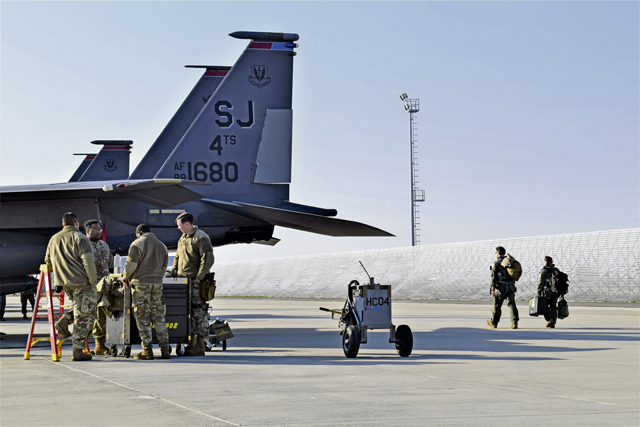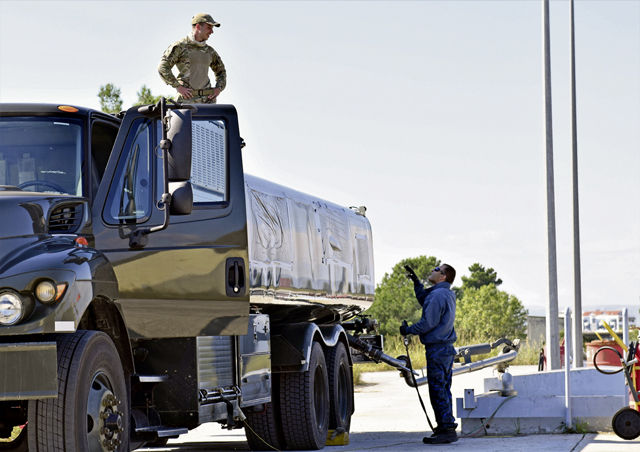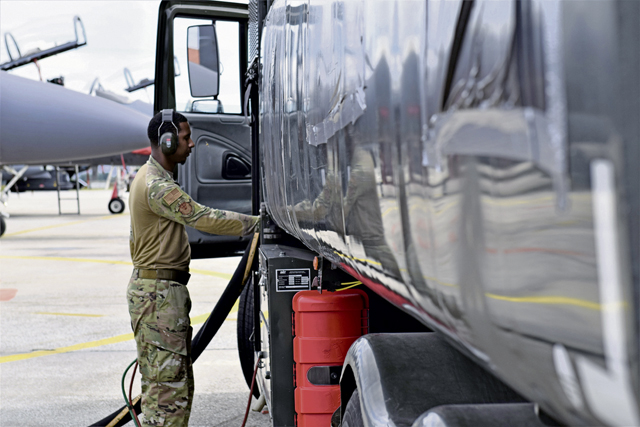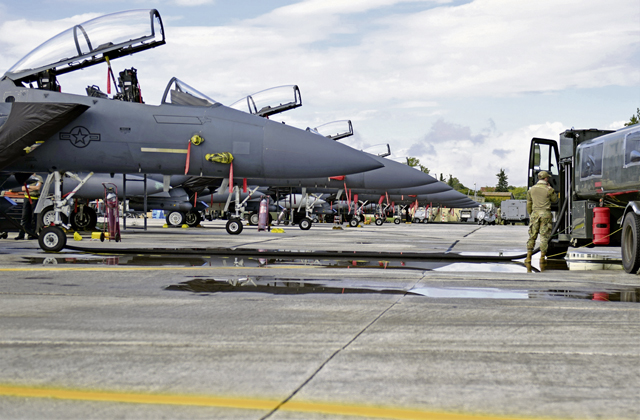It’s a fall morning in Eastern Greece and the rumbling afterburners of U.S. F-15E Strike Eagles can be felt across Larissa Air Base, a hub for NATO air activity in the Black Sea region.
When the jets are off and all is quiet, a smile breaks across the face of U.S. Air Force Staff Sgt. Matthew Boyles. A fuels specialist with the 4th Logistics Readiness Squadron, Seymour Johnson Air Force Base, North Carolina, Boyles knows what makes those afterburners scream.
“Without fuel, pilots are pedestrians,” he says. “We make it happen.”
Boyles is here supporting operation Castle Forge, a U.S. Air Forces Europe – Air Forces Africa-led joint, multinational training event. Castle Forge raises the U.S. commitment to NATO allies in the Black Sea region and shows the joint force’s combined ability to respond to threats with a reassuring presence.

For him, a typical day at Larissa involves coordinating with Greek base support personnel to fill his 6,000-gallon truck as many as five times in a single shift. From there, Boyles supplies fuel not only to the deployed U.S. aircraft but to vehicles and generators that power everything from air conditioners to communications infrastructure that support the Strike Eagles in their forward environment.
Since integrated flying operations with the Hellenic Air Force’s F-16 aircraft began on Oct. 11, U.S. aircrews from Seymour Johnson’s 336th Fighter Squadron say they have already accomplished much alongside their Greek allies.

“Our arrival here is the culmination of months of hard work and coordination between a number of different agencies and nations; not just in the U.S. but also with our allies,” says Lt. Col. Harry Starnes, Castle Forge project officer for the 4th Fighter Wing. “The fact that we were able to accomplish it so quickly just shows the commitment that we have for our allies and vice versa — the support we’ve received from them has been fantastic and has resulted in a successful deployment here to Larissa.”
To set the conditions that allowed the Strike Eagles to arrive and begin operations almost instantaneously, there had to be assurance that each crucial support element — like fuels and ground equipment — were in place.
U.S. Air Force Tech. Sgt. Steven Watson, an Aerospace Ground Equipment specialist with the 4th Expeditionary Maintenance Squadron, Seymour Johnson AFB, was a member of the advance team that arrived at Larissa Air Base on Sept. 30. He says that by definition, Castle Forge is meant to be carried out at short notice and with rapid movements.

“I had about two weeks’ notice that I was coming here, but to get our equipment ready, we had about two days,” says Watson. “For 48 hours, it was non-stop. We had day and night shifts working to make it happen.”
The agility demonstrated by the Strike Eagles’ rapid deployment to Greece proves that by leveraging strong partnerships with NATO allies, U.S. air power has the ability to disperse and continue operations nearly anywhere, at any time, with any platform.

This kind of flexibility will continue to be exercised at Castle Forge as the Strike Eagles perform other forward movements to locations in the Black Sea region. The operation will culminate by encompassing the USAFE MAJCOM-wide Agile Combat Employment Initial Operating Capability capstone event.
Perched in his fuel truck overlooking Larissa’s flight line, Boyles perfectly sums up the heart of Castle Forge.
“We can get up and go do this anywhere,” he says. “It’s just what we do.”


